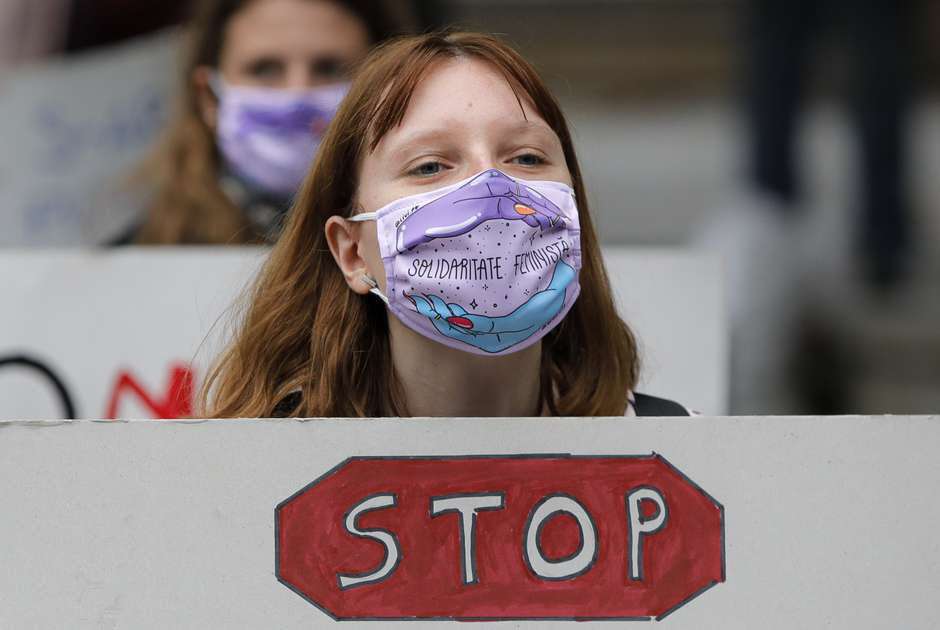Domestic violence against women surged by 23% during Spain’s first lockdown at the onset of the coronavirus pandemic in March 2020, according to a new study using data from the country.
The increase was associated twice as much with increasing economic stress than with lockdown-related stress, economists found through a survey of more than 13,000 Spanish women. And while sexual and psychological violence ticked up significantly, physical violence did not, according to the researchers.
“During extreme situations like a pandemic, domestic violence might increase because of the economic crisis, but also because of the lockdown,” said Esther Arenas-Arroyo, an economist at the Vienna University of Economics and Business in Austria and lead author of the paper, which will be published in the February 2021 issue of the Journal of Public Economics.
Arenas-Arroyo, who conducted the study alongside Daniel Fernandez-Kranz and Natalia Nollenberger of the IE Business School in Madrid, said that the results do not necessarily show a causal relationship between economic or lockdown-related stress and intimate partner violence. However, the economists did strengthen their results through a series of robustness tests.
“Our research is not unique to Spain,” said Arenas-Arroyo. “We find similar situations in other countries. In the U.S., domestic violence is really, really high.”
But while the surge in domestic violence is not unique to a single country, Spain was the ideal place to examine the impact of the coronavirus on domestic violence because its lockdown was earlier and stricter than those in other countries, said Arenas-Arroyo.
Spain, which implemented a lockdown on March 14, was the second European nation to do so after Italy, and enforced stricter rules than France or Britain ever did. Spaniards were barred from so much as walking outside for exercise, and just one member of each household was allowed to go to the grocery store.
“Spain was the perfect scenario to study this issue,” Arenas-Arroyo said. “You were locked at home with the whole family until the end of May. It was really, really, really strict and completely unexpected.”
As countries around the world implemented lockdowns in March and April, Arenas-Arroyo said that she read news articles that reported a surge in domestic violence by citing the number of emergency calls.
For example, the New York Times reported on April 6 that, "Domestic abuse is acting like an opportunistic infection, flourishing in the conditions created by the pandemic,” citing in part an 18% increase in calls to a domestic violence emergency line in Spain.
“I saw everyone [in the press] was getting crazy with these domestic violence calls,” said Arenas-Arroyo. “These don’t tell you anything about the real level of violence.”
Domestic violence calls to police are poor indicators of domestic violence, said Arenas-Arroyo, because many cases go unreported entirely. In addition, many Spaniards call the domestic violence line to ask questions about child custody issues and other problems that do not necessarily indicate abuse, she added.
Frustrated with the lack of reliable data, the researchers turned to Facebook, where they constructed a series of questions about “women during the pandemic.”
“You don’t ask women, ‘Do you suffer from domestic violence,’” Arenas-Arroyo said. Instead, the researchers asked a series of questions designed to indicate intimate partner violence in a technical way.
The questions were based on a 2019 national survey of violence against women in Spain, allowing the researchers to compare the more than 13,000 responses they received to an even-larger pre-pandemic dataset.
In addition to asking questions that could indicate intimate partner violence, the researchers also posed a series of questions designed to indicate economic stress. For example, they inquired about women’s employment status, the employment status of their partners, if they were worried about losing or finding a job or if they were temporarily suspended from work. They also asked whether the women and their romantic partners lived together.
The breadth of this data allowed the researchers to show that the increase in abuse was associated twice as much with increasing economic stress as lockdown-related stress.
Arenas-Arroyo, who said that her findings are “not unique to Spain,” added that economic devastation may remain once the pandemic is gone, possibly causing higher levels of domestic abuse for longer. This underscores the importance of social safety net programs, she said.
The research is consistent with prior work showing an association between rising domestic violence and the 2008-2009 Great Recession.
The researchers completed the paper quite quickly in comparison to other academic work. They came up with the research idea in March and conducted the Facebook surveys in May and June. After a series of revisions, the peer-reviewed paper was released online in December.
“It was the fastest paper I’ve ever written,” said Arenas-Arroyo.
An earlier version of the paper was titled “Can’t Leave You Now! Intimate Partner Violence under Forced Coexistence and Economic Uncertainty.” But for the final published version, the title was changed to the more clinical “Intimate partner violence under forced cohabitation and economic stress: Evidence from the COVID-19 pandemic.”
Arenas-Arroyo said the title was changed to be more technical.
The paper, titled “Intimate partner violence under forced cohabitation and economic stress: Evidence from the COVID-19 pandemic,” will be published in the February 2021 issue of the Journal of Public Economics.
The authors are Esther Arenas-Arroyo of the Vienna University of Economics and Business, as well as Daniel Fernandez-Kranz and Natalia Nollenberger of the IE Business School in Madrid. Arenas-Arroyo is lead author.

Granpa0 on January 22nd, 2021 at 03:50 UTC »
As someone that grew up in an abusive home, this is the aspect of the quarantine that really disturbs me. I think of all those people in that situation that are forced to spend all their time with some abusive asshole.
sereneeir on January 22nd, 2021 at 02:14 UTC »
Yep. Criminal defense paralegal here. Our cases are nearly all assault and domestic violence these days.
allboolshite on January 21st, 2021 at 22:26 UTC »
Are they considering the uptick in drinking and drug use as contributors?